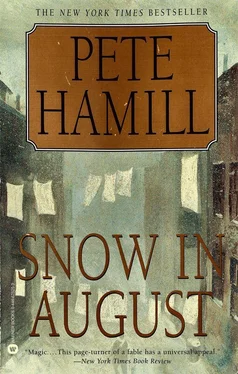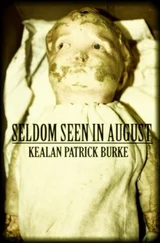Michael felt ignorant about the whole subject of Negroes. Except for Ebony in The Spirit and Fat Stuff in Smilin’ Jack , there were no colored people in the comics. There were no colored people in the movies, except for Rochester and that guy in the comedies who was always seeing ghosts and saying, “Feets, get moving.” There were no colored cowboys and no colored secret agents and no colored pilots. There were colored guys in the Tarzan movies, but they were natives, chasing Tarzan through the jungle; they weren’t from places like Brooklyn.
There was only one colored man in the parish, a janitor who lived in the basement of an apartment house across from the park. He was tall and bony and his skin was very black, and they would sometimes see him setting out the garbage cans in the mornings. He had no wife and no children and never said anything, not even good morning, and certainly never motherfucker. But he worked very hard. None of them knew his name. He was a man in gray overalls with black skin.
For an hour on this rainy night, Michael tossed and turned, wracked with his own ignorance. Finally he got up, turned on the light, slipped into the living room, and found the volume of the Wonderland of Knowledge marked Min-Pea . Back in his room, he read the one-page entry about Negroes. He knew they had been slaves, of course, knew that Arab traders had captured them and shipped them across the Atlantic. But he didn’t know that the slaveholders would not let them go to school.
The Negro entered America by the back door, and when freedom came to the slaves of the South, it brought with it innumerable problems that have not yet been entirely solved . The worst problem, the book said, was that many Negroes weren’t educated, and this hurt them when they started moving to northern cities after the Civil War. But Michael thought: That’s a problem around here too; Frankie McCarthy isn’t going to be a professor or work in an office. Neither are a lot of other guys. In settling in the Northern cities, the Negroes occupied neighborhoods that had already been lived in by others, creating problems of housing that have become critical in recent years . That’s like us too, Michael thought. We live in neighborhoods that were already lived in by others, and we have problems too, especially since the veterans came home and found out there’s not enough places for them to live. Last year, in a house on Saracen Place, the roof fell in, the building was so old, and three people were killed. There are rats in a lot of buildings. There are six apartments in this building and only one of them has a gas stove and there’s no steam heat. So what’s the big deal? Life in New York isn’t just hard for Negroes; it’s hard for lots of people.
But even with such bad educations, the book said, Negroes had added a lot to the culture of America. The native rhythm of the highly emotional Negro race has become a vital force in American music; and modern music, of which jazz is a form, has been profoundly affected, if not inspired, by the spirituals and “blues” which are entirely different from anything else found in music .
That paragraph made him wonder. Suppose Count Basie couldn’t play in America? Or Duke Ellington? Or Louis Armstrong? What if somebody said that they could only sell their records in Negro neighborhoods? What if Teddy Wilson and Lionel Hampton weren’t allowed to play in Benny Goodman’s band because they were Negroes? If they followed the rules of baseball, Negro bands would play for Negroes and white bands for whites and the musicians could never play with each other. Roy Eldridge couldn’t play with Gene Krupa. That would be nuts.
But maybe baseball is different.
No, that’s even more nuts.
Michael closed the book and returned to bed. He whispered: Trying to figure this out is one huge pain in the ass. I wish Jackie Robinson was white. But Jackie Robinson isn’t white. And he can play ball. And he could help us win the goddamned pennant. Period. Case closed, as Sonny says.
Besides, skin color was skin color, right? It was just the color of your goddamned skin. There was nothing anybody could do about that. You were born with it. Like some people were born with big feet or blue eyes. You didn’t make the choice. Your parents did. Or God did. God made Jackie Robinson a Negro. God made the choice, not Dixie Walker. What was it Rabbi Hirsch said?
Vos Got get iz gut …. What God gives is good…
In Michael’s drowsy mind, they began to merge into a group: Jackie Robinson, the Jews, the Catholics in Belfast, Benny Goodman and Lionel Hampton, Gene Krupa and Roy Eldridge, Rabbi Loew and Dvorele. And coming out of the smoke, sneering and hard, the goddamned Nazis and Brother Thaddeus and Frankie McCarthy swaggering around with the Falcons.
Vos Got get iz gut ….
Mumbling his borrowed Yiddish, longing for the dazzling clarity of summer, he fell into sleep, dreamy with images of Jack Roosevelt Robinson playing second base under the sun of Havana.
Each day for a week, spring rains slapped against the stained-glass windows of Sacred Heart and the stained-glass windows of the synagogue. Each day, steady sheets of advancing rain, monotonous and soft, were followed by sudden twisted columns of water, skirling and dancing, destroying umbrellas, lifting hats off skulls, spattering the newspapers on the wooden stand outside Slowacki’s until Mrs. Slowacki came out to cover them with a sheet of oilcloth held fast with a piece of angle iron. Basements flooded. Sewers backed up. Tree limbs snapped off and crashed into the yards. Shoes were ruined, their soles flapping like black tongues. Fungus seemed to sprout in clothes. In the apartments on Ellison Avenue, where the rain came pounding from the harbor like liquid ice, tenants stuffed towels into the sills of the kitchen windows and talked in the wet halls about how the weather was all different, wilder and fiercer, since the atom bomb.
For Michael, the raging spring weather was like something from a movie about the South Seas: a monsoon movie, a movie about hurricanes. With Jon Hall and Dorothy Lamour, and the evil prison guard, John Carradine, who looked like Emperor Rudolf of Prague. The power of the storms tested him, as it had tested Jon Hall, but it didn’t feel like punishment. The storms had such a radiant brightness to them, such a newness, that they made Michael Devlin happy. He wanted to run through them, to dive into the little rivers along the curbs, to splash and roll and laugh and dance.
The snow was soon gone, washed down the Brooklyn hills to the harbor. On the radio, Michael listened to Red Barber broadcasting the Dodger games from Cuba through invisible barriers of distance and static. The words coming through the tiny speaker of the leatherette radio were often unclear, gouged, scratched, crunched, making abrupt loops and bends in the air. But when he could hear Barber, the announcer’s voice was full of blue skies and palm trees. He never mentioned Jackie Robinson unless Robinson did something. There wasn’t much argument about Robinson in those radio accounts of distant games, no alarm or anxiety, no mention of dissension; radio was not the same as the newspapers. But Barber’s serene drawl was itself a guarantee that the season lay directly ahead of them. A season in which everyone knew that Jack Roosevelt Robinson would make history, just by showing up.
“I’ll tell you why I want Robinson to come up,” Michael said to his friends one afternoon. “Because it never happened before.”
“There was never an earthquake in Brooklyn before either,” Sonny said. “You want that to happen too?”
“Hey, maybe Frankie McCarthy would fall down a crack,” Michael said.
Читать дальше












